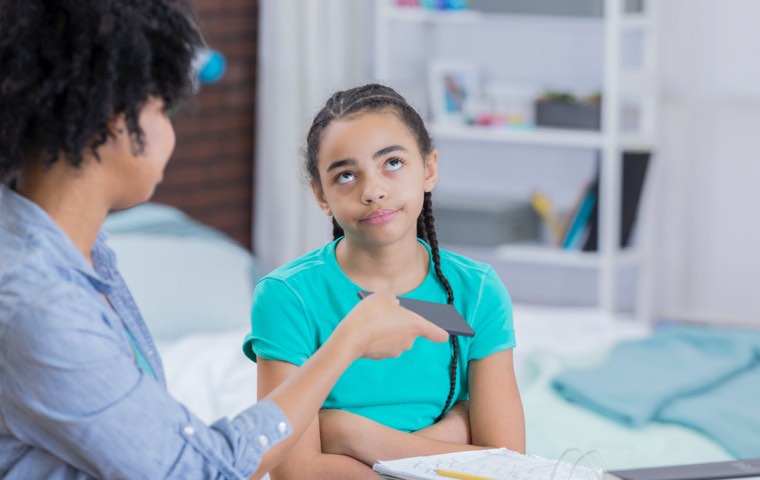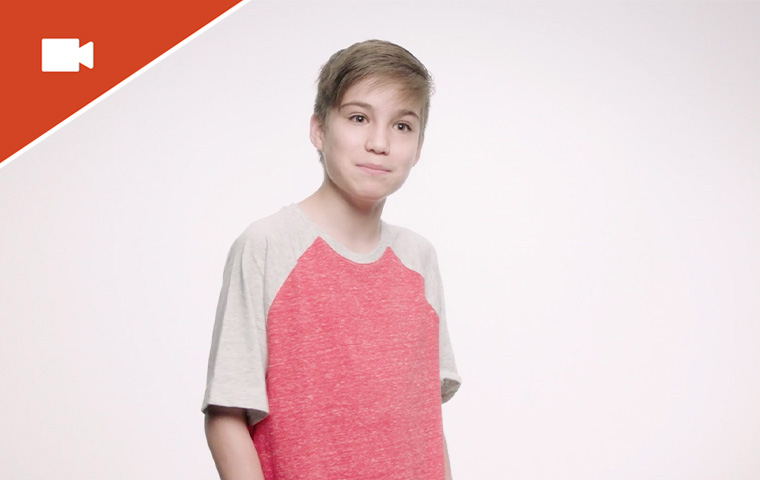Teenage Hygiene
If you're in the house with a tween you know it can get pretty stinky. On top of the emotional and body changes that come with puberty, your child has to deal with a whole new world of personal hygiene. Different kids have different ways of dealing with the changes. Some tweens get overly worried about hygiene, taking multiple baths or using perfumes and colognes. Others seem completely unaware of the ways that their body is changing and can't be bothered with sticking to a hygiene routine. No matter how your teen is handling it, she (or he) could probably use your support and guidance to stay clean, healthy, and happy.
It's Time for The Talk
If you haven't already talked to your tween about puberty, it's time. And if you've already had the talk, it might be time for a refresher to help them stay... fresher. Talking about body changes and teenage personal hygiene can be a very sensitive subject, so be thoughtful about how and when you bring it up. This kind of talk can be embarrassing for your child, especially if you're a mom talking to your son or a dad talking to your daughter. If your teen shuts down or becomes too embarrassed to have this conversation, it might help to have a parent or a relative of the same gender talk with your tween. Choose a quiet, relaxed time when nobody's in a hurry.
Choose a private time to talk, when it's just the two of you and you have time to chat without interruptions. You might talk to your child when you're in the car or on a walk.
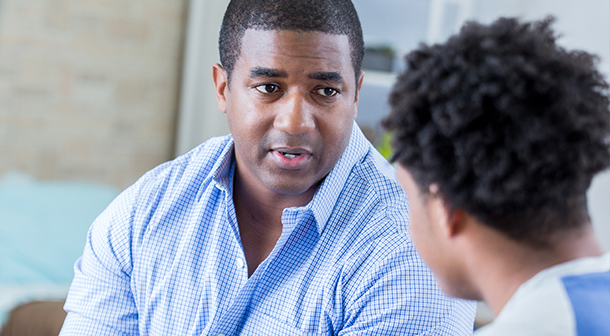
Covering the Basics of Body Changes
Do some research, and make sure you use the right words for things. You might want to practice saying words like penis, vagina, and menstruation if these words are different from the vocabulary you regularly use or you find them difficult to say. Explain that this is a time of many bodily changes, and that everyone's body changes at its own pace. Your talk should cover:
- New hormones and what they're doing to your tween's body.
- Hair growth in new places and options your tween has to manage it.
- Body changes and how your tween might be different from friends.
- Body odor and how to manage it.
- How boys and girls change differently.
Tell your child that you want to make sure she has all the information about what to expect. The key is to help your tween feel good and be confident, and don't be shocked if she has a lot of questions - some of them might surprise you! If you don't have the answers right away, work to find the answers together.
You may want to warn your tween that it's not always a good idea to trust what friends say about bodily changes and teenage personal hygiene. Encourage your tween to do her own research and to ask you, another parent or trusted adult, or her doctor if she wants more information.
If you're nervous about talking to your child, or you're worried you might leave something out, consider giving her a book about hygiene that she can read at her own pace. This doesn't replace the talk, but it may help both of you feel more comfortable and you can discuss it together.
What Does Clean Mean?
Start by setting up some expectations for teenage hygiene and what it means to be clean. You'll also want your tween to be prepared for future changes like shaving or her first period. Make sure your teen understands the importance of:
Bathing. Encourage your tween to take a bath or shower with soap every day. This is especially important after physical exercise. Remind her to wash her feet, armpits, groin, and bottom extra well. Let her pick out a special soap or shaving cream to encourage her to spend more time in the shower.
Face care. During puberty, tweens may need to start washing their faces morning and night with a gentle cleanser. Picking or touching zits can cause inflammation, spread more bacteria across the face, and even leave permanent scars. Make an appointment to see your doctor for advice if your child is having frequent breakouts or acne. Your doctor may recommend seeing a dermatologist.
Sweat and odor. Explain the difference between deodorant, which protects against underarm odor and bacteria, and antiperspirant, which limits sweating and underarm wetness. Let your child pick out one that she likes and remind her to use it daily, especially before exercise and after showering.
Clothes. Discourage your tween from wearing clothes multiple times before washing - even that favorite sweatshirt. Remind her to change her socks and underwear every day.
Hair. Remind your child to keep her hair clean - oily hair can make acne and skin conditions worse. Of course, different types of hair have different requirements. Use your judgment on how frequently your teen needs to wash or groom her hair.
Shaving. If your tween is ready to start shaving, get a razor and shaving cream and carefully walk her through the shaving process. Make sure you include how to clean up afterward.
Teeth. Everyone needs to brush and floss their teeth at least twice a day. Remind your child that not only do brushing and flossing keep teeth healthy, but they also help prevent bad breath. Mouthwash is also a great thing to keep in the bathroom, but let her know it's not a substitute for brushing and flossing.
Need parenting help now?
The Texas Parent Helpline is available 24/7.
- Call 833-680-0611
- Chat with us
- Text 833-680-0611
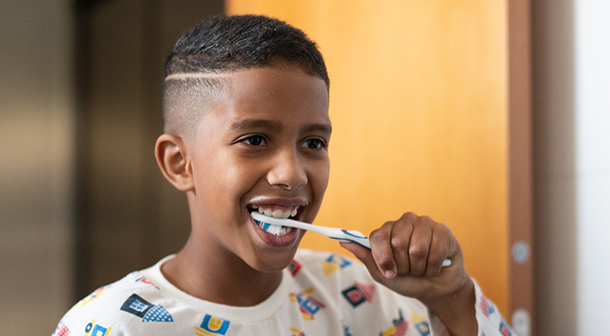
Remind your child to brush her tongue each time she brushes her teeth.
Hands. Encourage your tween to wash her hands before eating and after using the bathroom, sneezing, or playing with pets. Keep nails clean and discourage nail biting - it's super germy and those germs could potentially infect or irritate her gums!
Ears. If your tween wants to get pierced ears, make sure the person doing the piercing follows established health and safety measures. Ask how materials are sterilized before use or if they are disposable. Ask about piercing aftercare, and make sure your tween knows how to keep the new piercing clean and free of infection.
Smelling good. Perfume, body splash, and cologne should be applied very sparingly. Be aware that some schools do not allow students to wear scents or perfumes. Too much perfume can make others sick if they have asthma or are sensitivities to chemicals. Make sure you explain that perfume is not a substitute for showering.
Sharing and germs. Be clear that no one should share hairbrushes, makeup, drinks, or food. Sharing hats, hairbrushes, and scrunchies/hair bands can transmit lice from one person to another. Sharing makeup, especially eye makeup and mascara, can transmit bacteria and eye infections such as pinkeye. Sharing lipstick can transmit cold sores. And sharing drinks and food is an easy way to transmit viruses and bacteria from one person to another!
Sharing makeup brushes or foundation can spread bacteria, which can cause breakouts.
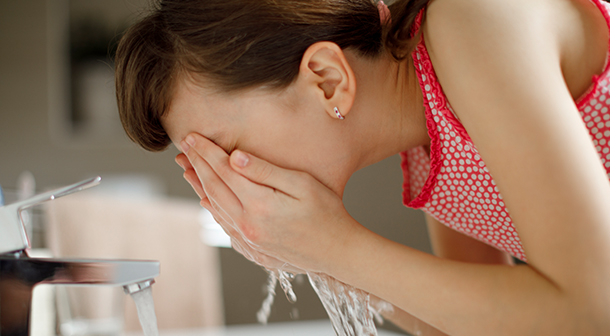
Hygiene Tips for Tween Girls
If your daughter hasn't had her first period, she probably has a lot of questions about when it will happen, how long it will last, what it will feel like, and if she should use a pad or tampon. There are also some social and emotional concerns about getting a first period, so make sure your child knows that this is a normal part of growing up.
While many tween girls choose to use pads when they first get their period, some choose to use tampons. There is no right age to start using tampons. Some tweens are scared to use them initially, find them difficult to use, or find them uncomfortable. It's a personal decision that your daughter will make when she's ready.
You can help her be prepared for her period by putting together a small zippered pouch she can put in her backpack. This pouch should include a clean pair of underwear and a few pads or tampons. She'll need to know that the backing on the pad peels off so it can stick on her underwear, and that she should plan to change her pad or tampon every 4-6 hours or whenever it gets soaked with blood. Show her how to fold up a used pad or tampon and wrap it in toilet paper before placing in a trash can. Remind her to never try to flush a used pad or tampon down the toilet - they can clog plumbing.
Clean Takes Time
Your tween may need more time in the bathroom to handle these new teenage hygiene rituals. Children with special needs might need even more time. Be patient and encourage your child to get up earlier or take care of things at night so she isn't late for school.
Know that teaching your tween to take care of her body is a process, and she'll get there eventually! And remember that compliments work better than nagging, so keep up the positive reinforcement!
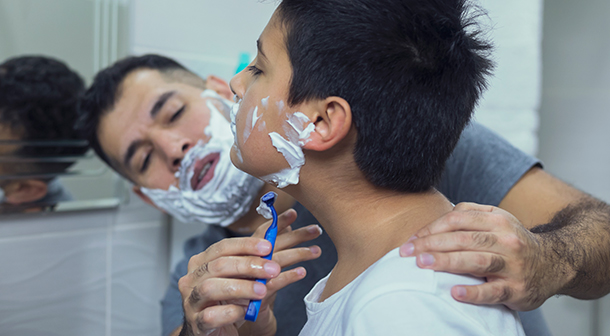
For More Information
- Preteen and Teen Hygiene Chart
- Download and print Promote Healthy Habits at Home, a tip sheet from our parenting resources.



